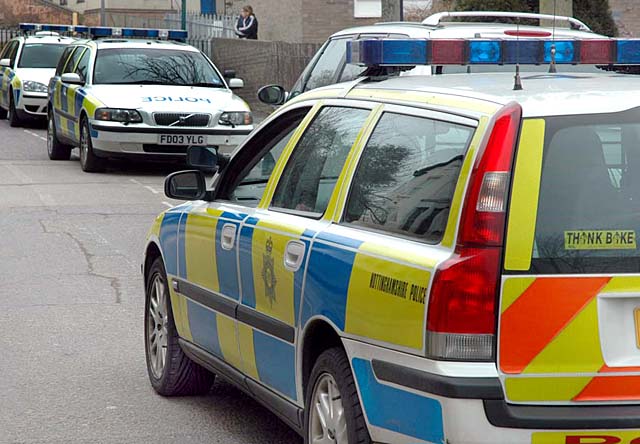
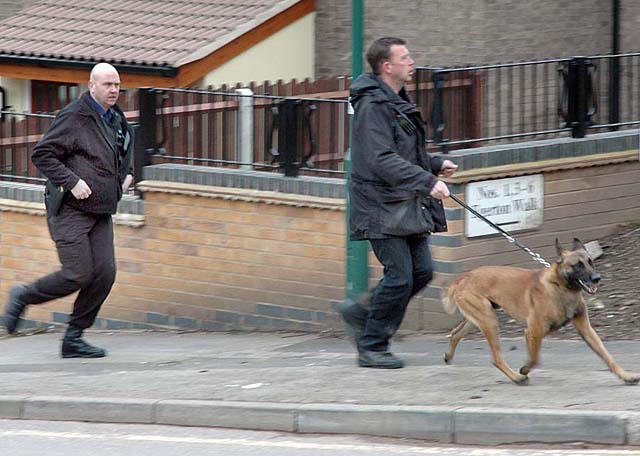
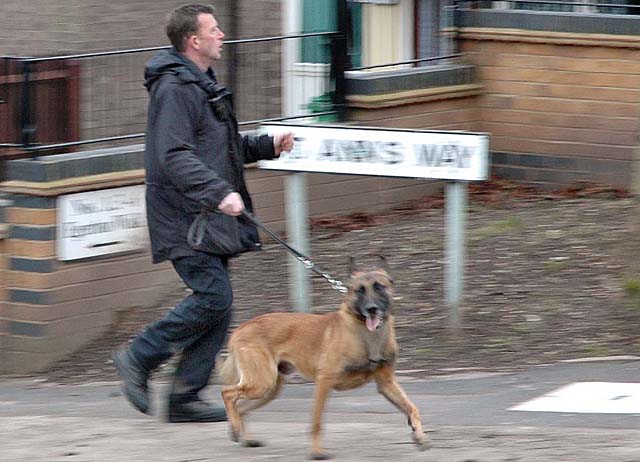
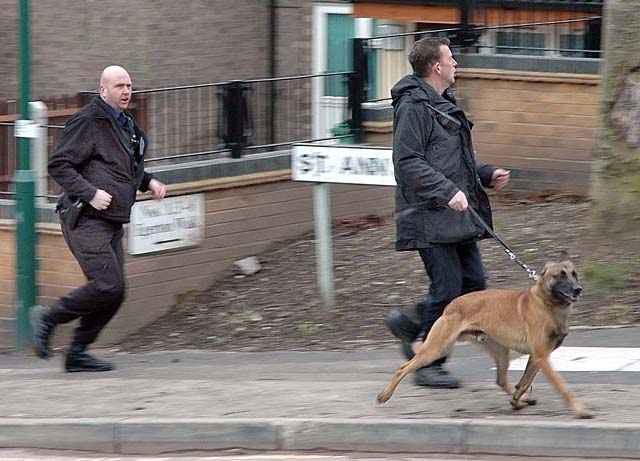
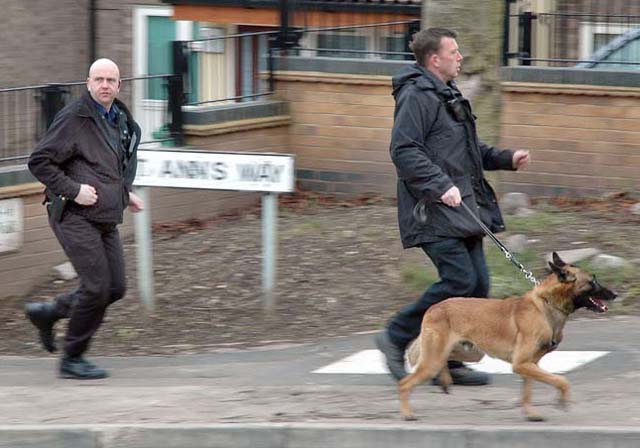
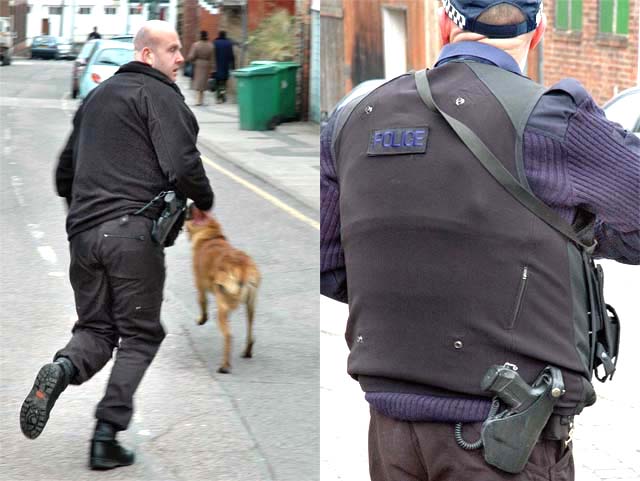
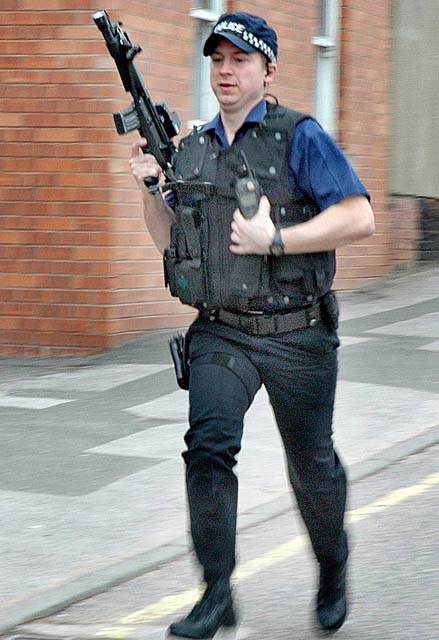
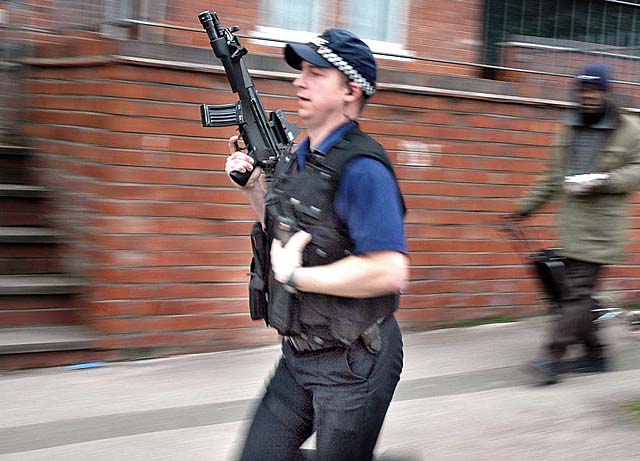
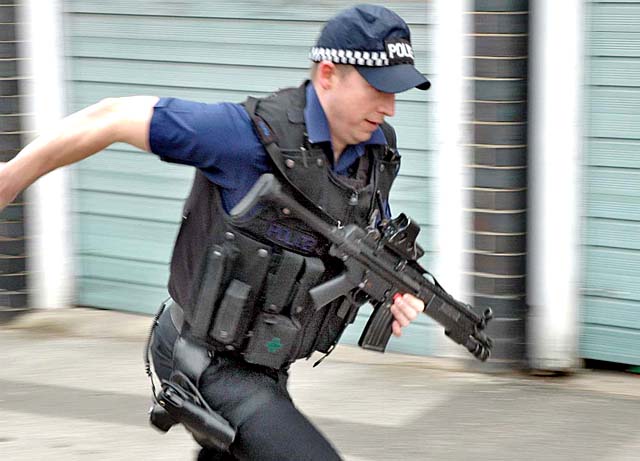
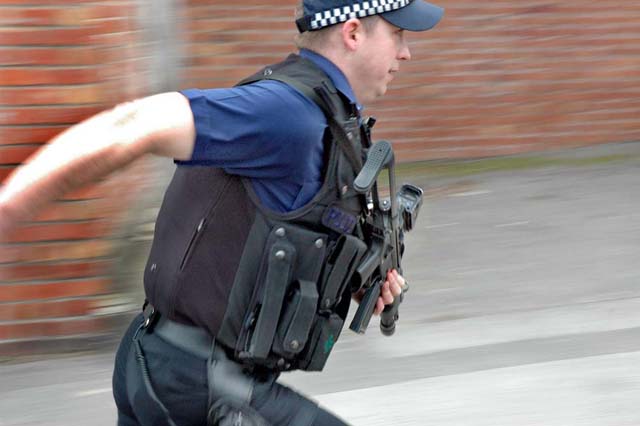
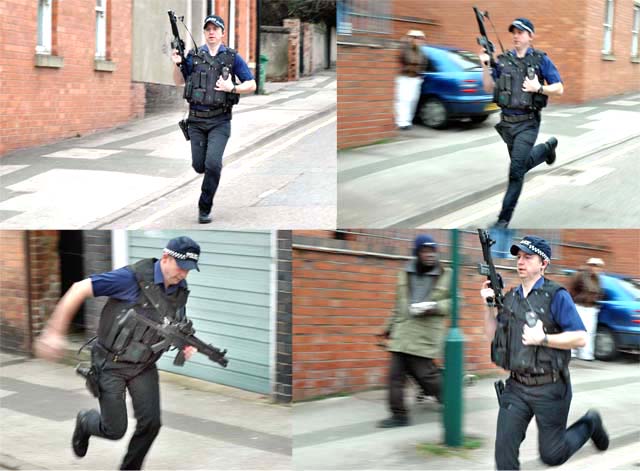
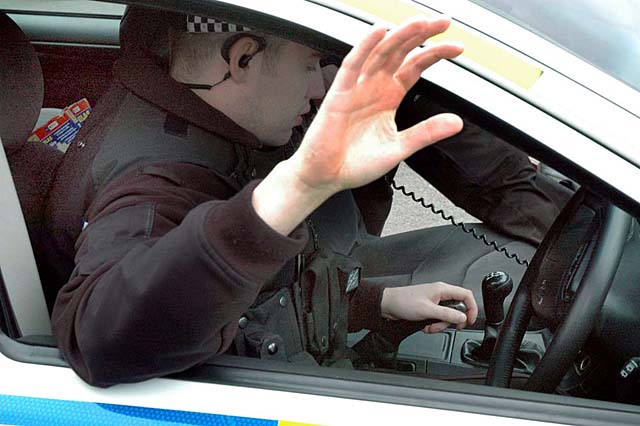
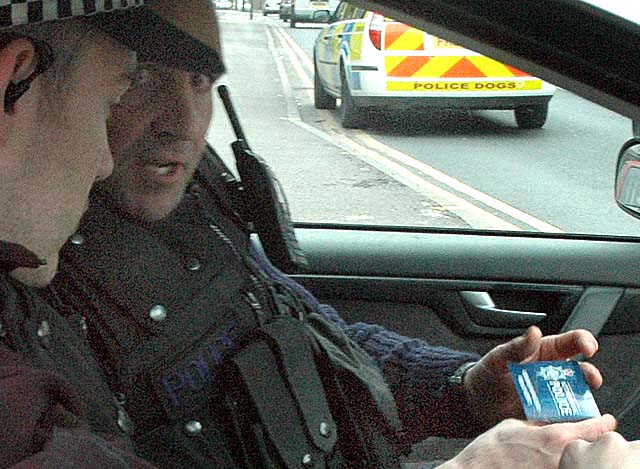
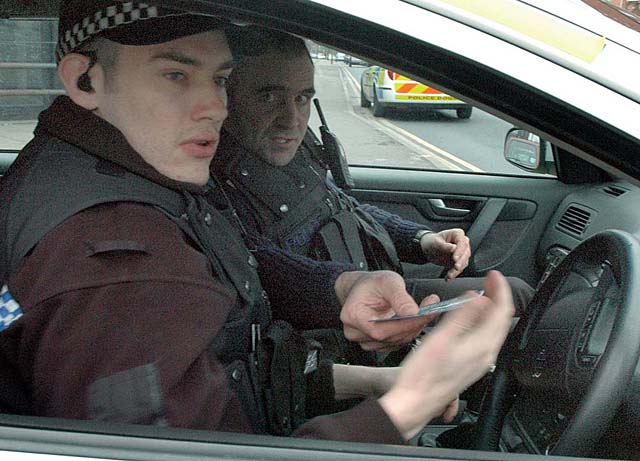
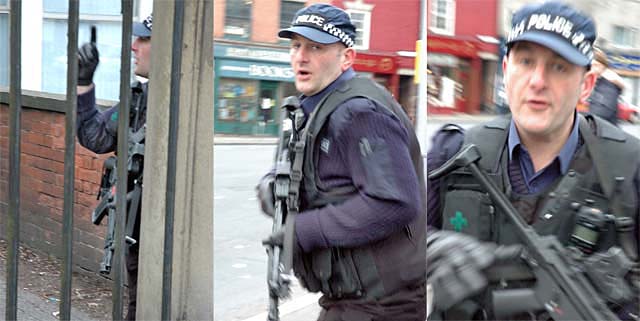
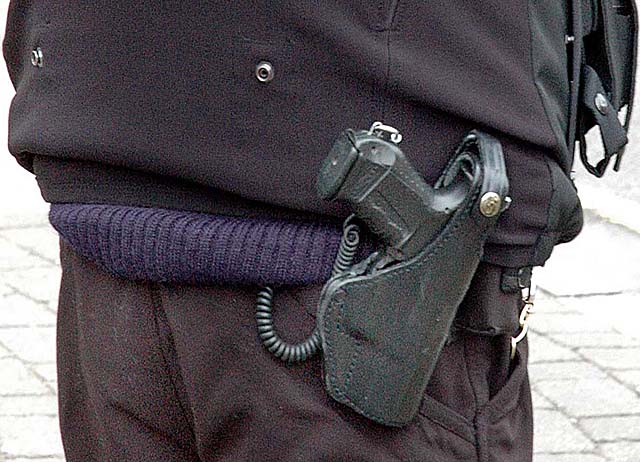
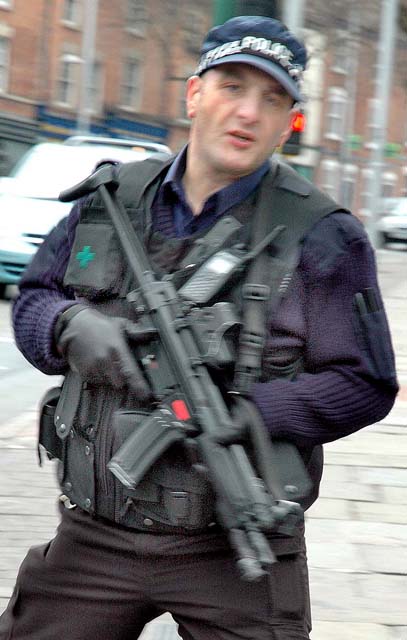
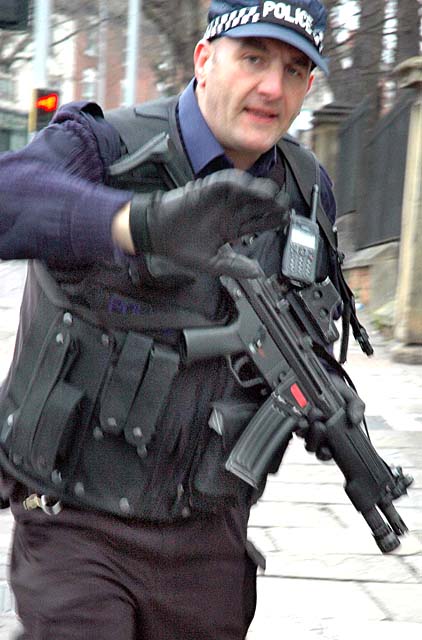
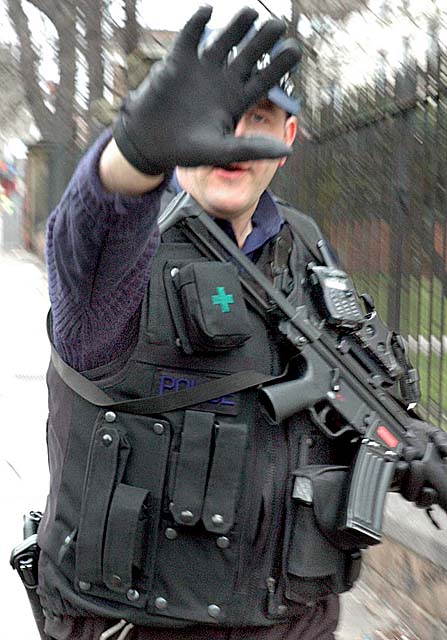
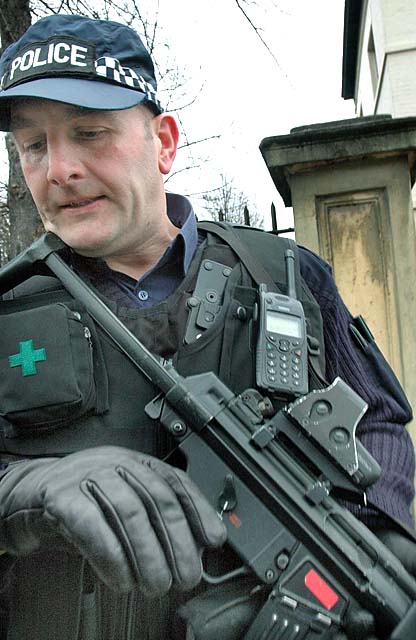
On saturday 18th March 2006, on the way to do some shopping and visiting in town, I diverted to follow some police activity, that turned out to be an armed turnout. Helicopter overhead and the heavy mob tearing about near Huntingdon Street and the Mansfield Road, with many guns, here in the centre of Nottingham.
I tried to tell the armed policeman 'look, I'm just trying to do my job' as he pushed me about.
Now, I have photographed armed incidents before:
Nottingham Armed turnout of Nottinghamshire Police
 http://indymedia.org.uk/en/regions/nottinghamshire/2005/08/320811.html
http://indymedia.org.uk/en/regions/nottinghamshire/2005/08/320811.html Nottingham Bomb Scare, Mansfield Road
 http://indymedia.org.uk/en/regions/nottinghamshire/2005/07/317959.html
http://indymedia.org.uk/en/regions/nottinghamshire/2005/07/317959.html at this sort of situation, I have not been so obstructed. I know about keeping my distance, cordons etc. But this time, I ended up being arrested for doing what I am legally allowed to do. Taking photographs in a public place. I believed it to be a matter of 'public interest'.
Being opposed in this activity by the police, is not so unusual for many of us. But this time, it was only weeks after the police issued some guidance to their officers, reminding them of their manners and that it is so permitted. As it further happens, I'm the chap that had been pressing for, and worked on thier introduction, here in Nottinghamshire.
New Police Guidelines agreed ::
 http://www.epuk.org/news/2006/03/guidelines2.html
http://www.epuk.org/news/2006/03/guidelines2.html There are many links to follow [below], and from the previous indymedia postings on the progress of this case. But the upshot of it all is that took 2 years, 12 court appearances, 6 police witnesses. NUJ employing a barrister for me and support of officers. A complete ignorance and lack of care by police [which is still largely true] on these agreed guidelines. I was eventually found guilty of 'Willful Obstruction of a Constable in the execution of his duty' and ended up with £400 court costs.
Although this was only a magistrates Court hearing, I received hundred of messages of concern from other photographers, press officers etc, who were all concerned at these turn of events, and wondering who such things are going to happen to next!
NUJ Nottingham branch secretary Kevin Stanley said: “We believe that this case raises important questions about the relationship between journalists and the police.”
“We particularly call on Nottinghamshire Police to ensure that guidelines issued to police staff and journalists more than eighteen months ago; are properly followed by officers. The guidelines, endorsed by the Chief Constable, state that journalists should not be moved on or arrested simply for doing their job.”
“Despite the best efforts of the corporate communications department of Nottinghamshire Police, we feel that not enough rank-and-file officers fully understand the need for these guidelines or why they are so important. We therefore call upon the chief constable to reiterate the letter and the spirit of the guidelines to all officers.”
Further, John Toner, the NUJ’s freelance organiser attended the whole trial and said he was “astonished” at the outcome. “In my opinion, our barrister Ben Mills was excellent and I remain convinced that the weight of evidence supported the defence. Alan was dignified and truthful throughout.”
“I would, though, urge photographers not to panic over this judgement. It was an unusual case, and the elements of one case cannot easily compare with the elements of another. The outcome should not deter photographers from going about their business as normal.”
Since this case, there have been so many stories of photographer being assaulted / arrested and simply just being harrased.
"Photographers Case Taken to Scotland Yard" ::
 http://www.nuj.org.uk/innerPagenuj.html?docid=760
http://www.nuj.org.uk/innerPagenuj.html?docid=760 NUJ General Secretary, Jeremy Dear staged a one-man protest outside the headquarters of the Metropolitan Police on Friday (28/03/2008), to highlight the failure of law enforcement officers to protect media freedoms.
The event, attended by dozens of press photographers, was in response to numerous complaints about how the police deal with the media, particularly at public events and demonstrations.
Photographer members of the union are frustrated because they are regularly obstructed from doing their jobs by police officers who don’t understand the law around media freedom. Jeremy hoped that his one-man demo would help senior police officers spot the difference between a protester and photographers covering the protest.
Last year a set of guidelines on dealing with the media was agreed between the NUJ and the Association of Chief Police Officers, an extension of guidelines already agreed with the Metropolitan Police. However, cases have continued to surface of police officers taking action that is not within their legal powers. Most cases involve officers obstructing photographers from taking photos and the confiscation or deletion of pictures once they have been taken.
There are also examples of journalists being arrested, or threatened with arrest, because they have refused to stop taking photos and in other cases photographers have had their equipment seized. Many NUJ members have reported being physically and mentally intimidated by the police and some cases have included actual physical violence.
Photographers regularly criticise the police for their handling of the media at major events, particularly public demonstrations where officers often fail to draw a sufficient distinction between protestors and members of the press who are reporting on the event.
To mark the protest, Jeremy Dear has sent a letter to New Scotland Yard highlighting the union’s concerns. A letter from the NUJ Parliamentary Group to the Home Secretary has also been dispatched to the Home Office to raise the issue at the highest levels.
Speaking in advance of the protest, Jeremy Dear said: “It’s a shame that we have to hold a stunt like this to help the police spot the difference between a protestor and a press photographer. It really isn’t that difficult.
“What’s really frustrating is that guidelines are already in place which should deal with the problems we experience. We’re not even campaigning for a change to the rules. All we want is for the policy that currently exists to be properly enforced.
“Although the one-man protest is intended to be a little light-hearted, this is a really serious issue. Police officers are preventing photographers from reporting on important events with action that is at times bordering on harassment. In an open and democratic society it’s vital that photographers and members of the media are free to report on what is going on in the world. Police officers need to understand their responsibilities when it comes to respecting media freedom.”
*****
Open letter to Jeremy Dear
General Secretary
National Union of Journalist
Hello Jeremy
Thank you for your efforts in highlighting our continued difficulties with police, these continue in spite of the guidelines and agreement that we had. The one man show at Scotland Yard might get it discussed a bit more in our own professional circles, but I still wonder if there will be any progress with the police themselves. Further thanks for coming to Nottingham and being a supporter in my own case here.
I think in a democratic society like ours (??) the more senior police managers can only agree with us, that it is not an offence to take photographs in a public place and to pursue stories of public interest. Hence, I guess, we will find little opposition in agreeing the guidance with them. You will know that the real problems begin with the lower ranks.
Since my own arrest for obstruction, my adventures continue with a situation at least once a week.
You may know that on the Nottinghamshire Police Guidelines cover, it says: "Guidelines for police and media at incidents".
On several occasions, I have been told by police that: "ah mate, no, it's not an incident, it's a scene!!". For this to have happened several times, clearly there have been some watchroom conversations about it all, and to think up devices. Then, at a couple of criminal justice events, I found myself in conversation with middle rank Inspectors and Chief Inspectors who knew nothing of the issue of these guidelines locally. They were to have been widely distributed within the force after agreement.
A more common reaction though, when police are trying to prevent pictures being taken or I'm being hassled about my presence, is simply to push them back at me, without reading them or acknowledgement. Thus to plead continued ignorance of their provisions. Basically they just don't care. Down here on the street, nothing has changed, all is the same as ever.
There is now another level of policing, non-warranted officers, wardens etc .... I have to say that they are even less clued-up, than the average policemen and these can be even more officious, and lack understanding of their powers.
John Toner was interviewed for this piece, you might find interesting:
 http://current.com/items/88856223_you_can_t_picture_this
http://current.com/items/88856223_you_can_t_picture_this Since they do lack such understanding, I have asked locally if the wardens have been issued with the guidelines. I have been told that it was not relevant to do so and was not appropriate. Well, in the light of experience, I think it is.
You may also know that when we negotiated the Nottinghamshire Guidelines locally, I had made freedom of information act enquiries of all police forces [john has copies of all these], asking about there treatment of photographers at situations. It was the differences of reply that leads us to suppose that national guidance is required.
I think experience has shown though, that even if all is taken nationally, there is no consequence for them being ignored by police, and so they are. They do not form part of police operational orders. I know only to well of what happens to us if we are accused of dis-obeying police instructions, we get arrested and convicted. I understand the Legal Officer was taking steps to see if these guidelines provisions could be included in the police and criminal evidence act. As far as I can see, this is the only way that the police will respect them, that if by ignoring them, that they break the law themselves.
Anyway, as I started, I just want to say thanks for your effort. It's such a long road, and quite tiring.
Regards
Alan Lodge
*****
Original Statement about it all:
Time: 14:30 > Note began being laid out at about 18:00
Date: Saturday 18th March 2006
Location: St Ann’s Hill Road, Alfred Street, Mansfield Road, Huntingdon Street, Nottingham
Situation:
At about 14:30 I am on the way down Woodborough Road, heading to town. I become aware of 2 Volvo estate police cars driven at some speed in the same direction as me. The police helicopter then appeared overhead and to my right. Having got my camera kit with me, I thought I would investigate. I turned right on to Cramner Street. There I sighted an armed officer at the side of the road, with sub-machine gun, held across his chest. I grabbed my bag, and asked this officer if I could go down an alley near what he appeared to be guarding. He said yes. However, nothing of interest was that way, and I returned.
Walking further down Cranmer Street, then left on to St Ann’s Road. There were 3 or 4 police cars parked. I photographed this scene at the top of the hill, and seeing activity further down the road, I continued. An officer ran down the hill on the other pavement past me and I photographed his progress. I then carried on down St Ann’s Road to the bottom of the hill, where Elm Avenue a footpath meets the Mansfield Road.
There by the entrance to the footpath was another armed officer, again with a sub-machine gun, across his chest. He was guarding this area, and could see further up the footpath. There were no police cordons laid out, but I did not attempt to pass him. However, I began to photograph him from about the pavement-width away. The officer assumed an aggressive stance and shouted at me to stop taking photographs. I told him I found the scene interesting, being in a public place, and that I wanted to continue. I was about to produce my NUJ card, to offer credentials when he closed at me at speed and pushed the camera and me away with some force. I asked him not to do that, and then attempted to describe and show the NUJ / Police Guidelines, recently adopted by the constabulary, that I felt described and covered such a situation.
His aggression increased and was positively uninterested in my explanation and forcefully pushed the guidance card away when proffered. Each time I withdrew from the officer to take further photographs he continued to close on me. I asked for his name because he did not wear any identity numbers. He did not and would not say who he was. His aggression continued with me, patience clearly snapping, he turned me sharply about and informed me, at some volume, that I was under arrest and began to caution me. During this shoving about, I could clearly feel his gun in my back. The reason for arrest, me stated as being “assault on a police officer”.
My camera bag was forcibly taken from me, and the assistance of another officer, was summoned. Again, he would not identify himself. He wore a side arm. The situation was dynamic and we had moved from the corner of Elm Avenue into Alfred Street. Because the incident was ongoing, I was being “de-arrested” because they was busy with 'other matters'.
Police were thus still in possession of my camera and equipment bag. I say if I am no longer arrested, then I want it back. Further, as already stated, no officer to this point was identifiable by number and further they would not say who they were. No receipt having been given, they were just wandering of with it down the street with it.
PC then turned round and together with another who must have been immediately behind me, then shoved me with some considerable force against a white, parked vehicle. Both arms were wrenched up behind my back, causing me some pain. Further, being a sufferer of lower back pain for some years, I was forced into a very uncomfortable posture over this parked vehicle. I was then again arrested for “breach of the peace”, and someone else said “obstruction of police”. I was cautioned for the second time.
The violence against me, I felt to be punishment, plain and simple, for my earlier non-compliance in persisting with my photography, and in response to me asking for my property back. There was no question of my physical resistance, and I am dealing with armed officers.
Things calmed down a little and I am left in custody of a PC, with many other officers and police car, circulating the area.
Arresting PC and I then walked down to junction with Huntingdon Street. The officers who previously would not identify themselves, were on the other side of the road, and I asked the dog handler, if I would be allowed to photograph them for evidence. He said he “rather I didn’t”. But if I did? He then said “the dog might be set on me and I would be handcuffed, and then I wouldn’t be able to hold the camera”.
Then conveyed from scene to Bridewell Police Station. Held in a custody cell a while, then to be told that my camera bag, containing all my kit would be seized as evidence. When in front of the Custody Sergeant, I insisted that this should be sealed in an evidence bag. I did not want the memory card deleted or otherwise interfered with. I expect there will now be a record when / if this bag is opened for evidence.
I asked for a pen and paper. I was told that I could have some, but neither arrived. I asked for the codes of practice. Apparently, their last copy was torn up, they looked for another they said, but again, not supplied.
I informed Custody Sergeant of the assault on me, and asked for a doctor to be contacted. I informed him of pain in both my shoulders and lower back pain. He said this would be logged.
I was then charged and cautioned for a third time. I made reply that I wanted to draw attention to the Police / Media Guidelines. Further, and more specifically, to item 7 contained in them. Custody Sergeant did not note this, saying: “there wasn’t enough room on the form”. He then invited me to sign, which I declined to do, because it did not contain a full record of my reply. He thus wrote “refused”. I said I would still like that reply noted, but he declined and ignored me. I then asked for a senior officer to attend and to note a complaint.
*****
>>>>>>
This is what the guidance was supposed to cover .....
NOTTINGHAMSHIRE POLICE :: GUIDELINES FOR THE POLICE AND MEDIA AT INCIDENTS
*****
1. The media has a legitimate role to play in informing the public and they will attend the scene of incidents. The presence of a photographer or reporter at an incident does not of itself constitute any unlawful obstruction or interference.
2. Journalists need to collect information about an incident as quickly as possible. Some of this information may seem irrelevant, unimportant or improper to an officer. However, as long as the journalist does not break the law, or interfere with an investigation, or cross a cordon, the police officer should not impede the reporter. Journalists who break the law will be dealt with in the same manner as any other offender.
3. A crime scene remains closed to the media whilst evidence is being gathered and detailed forensic examinations take place. The reasons for denial of access should be explained to the journalist and access granted as soon as possible with permission from the Senior Investigating Officer.
4. Journalists have the right to photograph and report events that occur on public property. The police may invite journalists on to private property where an event of public interest has occurred and they have the permission of the owner. They should enter peacefully and not cause any physical damage or attempt to alter any details for photographic purposes. The rights of an owner of private property should be respected and may lead to journalists being asked to leave. If the owner of the property does not give permission then any attempt to gain access would be trespass.
5. Any journalist should be able to show relevant media identification if asked. At the scene of an incident this identification should be visible at all times.
6. Police officers should not restrict journalists from taking pictures or asking questions of other parties, even though the officer may disagree with the journalist's purpose. It is not a police officer's role to be the arbiter of good taste and decency. It is an editor's role to decide what to use.
7. Police officers do not have the authority to prevent a person taking a photograph or to confiscate cameras or film, and such conduct could result in criminal, civil or disciplinary action.
8. In the event of a distressed or bereaved individual making a specific request for the media to leave them in peace the officer should pass this information on to the journalist. However, this is advice on which journalists and their editors must base their own decisions. If the situation becomes an identifiable Breach of the Peace then journalists, as any other citizen, have a duty to disperse if asked to do so.
9. Journalists should not park their vehicles in a way that will obstruct other traffic or hamper emergency vehicles or officers carrying out their lawful duty.
xx
These guidelines have been sanctioned by Chief Constable Steve Green and the National Union of Journalists.
*****
These links provide some of the background to my own legal adventures with Nottinghamshire Police, after agreeing these guidelines!
Nottingham photographer arrested by armed officers
 http://indymedia.org.uk/en/2006/03/336778.html
http://indymedia.org.uk/en/2006/03/336778.html Indymedia photographer arrested by armed officers [feature]
 http://indymedia.org.uk/en/regions/nottinghamshire/2006/03/337223.html
http://indymedia.org.uk/en/regions/nottinghamshire/2006/03/337223.html Date set for photographer 'obstruction' trial for snapping armed police
 http://indymedia.org.uk/en/2006/05/341466.html
http://indymedia.org.uk/en/2006/05/341466.html World Press Freedom Day 3 May
 http://indymedia.org.uk/en/regions/nottinghamshire/2006/05/339644.html
http://indymedia.org.uk/en/regions/nottinghamshire/2006/05/339644.html Serial Indymedia contributer in court today
 http://indymedia.org.uk/en/2006/10/353783.html
http://indymedia.org.uk/en/2006/10/353783.html Photographer is arrested taking pictures of police, Press Gazette, 7 April 2006
 http://www.pressgazette.co.uk/story.asp?sectioncode=1&storycode=33750
http://www.pressgazette.co.uk/story.asp?sectioncode=1&storycode=33750 Defend the Nottingham One (again)
 http://www.londonfreelance.org/fl/0610tash.html?i=flindex&d=2006_10
http://www.londonfreelance.org/fl/0610tash.html?i=flindex&d=2006_10  http://www.londonfreelance.org/fl/0607tash.html
http://www.londonfreelance.org/fl/0607tash.html British Journal of Photography: Police guidelines adopted
Date: 30 May 2007
Guidelines designed to help improve relations between the police and press photographers will be rolled out nationwide in the next few months, but already sceptics are voicing concerns that they will have little effect.
 http://www.bjphoto.co.uk/public/showPage.html?page=448744
http://www.bjphoto.co.uk/public/showPage.html?page=448744 British Journal of Photography: Watching the detectives
Date: 30 May 2007
Katie Scott, News Editor.
 http://www.bjphoto.co.uk/public/showPage.html?page=448758
http://www.bjphoto.co.uk/public/showPage.html?page=448758 Press Gazette: Photographer's shock at obstruction ruling
20 August 2007
 http://www.pressgazette.co.uk/story.asp?sectioncode=1&storycode=38513&c=1
http://www.pressgazette.co.uk/story.asp?sectioncode=1&storycode=38513&c=1 NUJ calls for an end to journalist arrests
 http://www.pressgazette.co.uk/story.asp?sectioncode=1&storycode=38524&c=1
http://www.pressgazette.co.uk/story.asp?sectioncode=1&storycode=38524&c=1 British Journal of Photography: NUJ fears PACE change
Date: 8 August 2007
 http://www.bjphoto.co.uk/public/showPage.html?page=461964
http://www.bjphoto.co.uk/public/showPage.html?page=461964 NUJ Photographers Case Taken to Scotland Yard
 http://www.nuj.org.uk/innerPagenuj.html?docid=760
http://www.nuj.org.uk/innerPagenuj.html?docid=760 Current TV [Google Channel] You Can’t Picture This, Oh yes you can!
 http://current.com/items/88856223_you_can_t_picture_this
http://current.com/items/88856223_you_can_t_picture_this APRIL FOOL: Met Police to relax London photography restrictions in pilot scheme
 http://www.epuk.org/News/836/met-to-relax-london-photography-restrictions
http://www.epuk.org/News/836/met-to-relax-london-photography-restrictions ....... actually, on writing this lot ...... I have discovered such large numbers of links about these issues, that I think it would just make most readers feel lost! So, if there are any out there that want more of the guided tour of the interweb on these issues, I guess email me and I'll send you the mega-list.
--------------------------------------------------------------
EPUK Golden Sureshot Awards 2006
Clouseau Award For Law Enforcement [sponsored by the Marx Brothers Foundation]
 http://www.epuk.org/News/436/the-epuk-2006-awards
http://www.epuk.org/News/436/the-epuk-2006-awards Winner: Nottinghamshire police, for the arrest of photographer Alan “Tash” Lodge.
The judges’ verdict: “The police unit’s arrest, de-arrest, re-arrest, second de-arrest and final re-arrest of Tash displayed all the timing skills a fast moving farce needs: we expected Manuel or Basil Fawlty to appear at any moment.
But the Sheriff of Nottingham’s men added an ironic post modernist twist by arresting the very man who’d helped them draw up their own press liaison guidelines. We were also impressed by the fact that whoever the police thought there were chasing, the only successful arrest they apparently made that day was of a passing photographer out shopping, and that at the third attempt.
The award will be presented to Nottingham Chief Constable Steve Green, since the actual officers involved chose to remain anonymous throughout the performance.
In an era when the cult of personality is almost overwhelming we can only applaud their modesty.”
--------------------------------------------------------------
____________________________________________
ALAN LODGE
Photographer - Media: One Eye on the Road. Nottingham. UK
Email:
 tash@indymedia.org
tash@indymedia.org Member of the National Union of Journalists [No: 014345]
____________________________________________
"It is not enough to curse the darkness.
It is also necessary to light a lamp!!"
___________________________________________


 e-mail:
e-mail:
Tash report it also to relevant journals
07.04.2008 12:41
kriptick
 Homepage:
http://www.amateurphotographer.co.uk/
Homepage:
http://www.amateurphotographer.co.uk/
Guideline text from Nottinghamshire and the MET
07.04.2008 12:56
pic: Thanks to Pete Jenkins
*****
1. The media has a legitimate role to play in informing the public and they will attend the scene of incidents. The presence of a photographer or reporter at an incident does not of itself constitute any unlawful obstruction or interference.
2. Journalists need to collect information about an incident as quickly as possible. Some of this information may seem irrelevant, unimportant or improper to an officer. However, as long as the journalist does not break the law, or interfere with an investigation, or cross a cordon, the police officer should not impede the reporter. Journalists who break the law will be dealt with in the same manner as any other offender.
3. A crime scene remains closed to the media whilst evidence is being gathered and detailed forensic examinations take place. The reasons for denial of access should be explained to the journalist and access granted as soon as possible with permission from the Senior Investigating Officer.
4. Journalists have the right to photograph and report events that occur on public property. The police may invite journalists on to private property where an event of public interest has occurred and they have the permission of the owner. They should enter peacefully and not cause any physical damage or attempt to alter any details for photographic purposes. The rights of an owner of private property should be respected and may lead to journalists being asked to leave. If the owner of the property does not give permission then any attempt to gain access would be trespass.
5. Any journalist should be able to show relevant media identification if asked. At the scene of an incident this identification should be visible at all times.
6. Police officers should not restrict journalists from taking pictures or asking questions of other parties, even though the officer may disagree with the journalist's purpose. It is not a police officer's role to be the arbiter of good taste and decency. It is an editor's role to decide what to use.
7. Police officers do not have the authority to prevent a person taking a photograph or to confiscate cameras or film, and such conduct could result in criminal, civil or disciplinary action.
8. In the event of a distressed or bereaved individual making a specific request for the media to leave them in peace the officer should pass this information on to the journalist. However, this is advice on which journalists and their editors must base their own decisions. If the situation becomes an identifiable Breach of the Peace then journalists, as any other citizen, have a duty to disperse if asked to do so.
9. Journalists should not park their vehicles in a way that will obstruct other traffic or hamper emergency vehicles or officers carrying out their lawful duty.
xx
These guidelines have been sanctioned by Chief Constable Steve Green and the National Union of Journalists.
*****
Then a little later, the Guidelines for Metropolitan Police Service staff were issued. Derived from some of our hard work in Nottinghamshire and Staffordshire.
*****
Guidelines for Metropolitan Police Service staff on dealing with media reporters, press photographers and television crews
I believe - and many of you believe - that a key factor in the way we work is how we treat one another and the members of the public with whom we come into contact. Ian Blair, Commissioner.
We will build trust by listening and responding. Be accessible and approachable. Build relationships. Encourage others to challenge and get involved.'
Met statement Our values
Members of the media are not only members of the public; they can influence the way the Metropolitan Police Service is portrayed. It is important that we build good relationships with them, even when the circumstances are difficult. They have a duty to report many of those things that we have to deal with - crime, demonstrations, accidents, major events and incidents. This guide is designed to help you take the appropriate action when you have to deal with members of the media.
1. Members of the media have a duty to report from the scene of many of the incidents we have to deal with. We should actively help them carry out their responsibilities provided they do not interfere with ours.
2. Where it is necessary to put cordons in place, it is much better to provide the media with a good vantage point from which they can operate rather than to exclude them, otherwise they may try to get around the cordons and interfere with police operations. Providing an area for members of the media does not exclude them from operating from other areas to which the general public have access.
3. Members of the media have a duty to take photographs and film incidents and we have no legal power or moral responsibility to prevent or restrict what they record. It is a matter for their editors to control what is published or broadcast, not the police. Once images are recorded, we have no power to delete or confiscate them without a court order, even if we think they contain damaging or useful evidence.
4. If someone who is distressed or bereaved asks for police to intervene to prevent members of the media filming or photographing them, we may pass on their request but we have no power to prevent or restrict media activity. If they are trespassing on private property, the person who owns or controls the premises may eject them and may ask for your help in preventing a breach of the peace while they do so. The media have their own rules of conduct and complaints procedures if members of the public object.
5. To help you identify genuine members of the media, they carry identification, which they will produce to you on request. An example of the UK Press Card is shown [on the paper guidelines].
6. Members of the media do not need a permit to photograph or film in public places.
7. To enter private property while accompanying police, the media must obtain permission, which must be recorded, from the person who owns or is in control the premises. We cannot give or deny permission to members of the media to enter private premises whether the premises are directly involved in the police operation or not. This is a matter between the person who owns or is in control the premises and the members of the media.
8. Giving members of the media access to incident scenes is a matter for the Senior Investigating Officer. The gathering of evidence and forensic retrieval make access unlikely in the early stages and this should be explained to members of the media. Requests for access should be passed to the Senior Investigating Officer who should allow access in appropriate cases as soon as practicable.
9. Advice and assistance in dealing with members of the media is available 24 hours a day via the Press Bureau at New Scotland Yard.
*****
So, that's all clear then.
Tash [alan lodge]
 e-mail:
tash@indymedia.org
e-mail:
tash@indymedia.org
who polices the police?
07.04.2008 20:31
Thanks for getting these pix out there Tash, interesting to see tham, even if you have missed the local rag's news deadline by a couple of years ;-)
Tony Gosling
 Homepage:
http://www.public-interest.co.uk
Homepage:
http://www.public-interest.co.uk
Appeal
07.04.2008 23:17
Did you appeal against your conviction of obstruction?
Andy
"1000s of people take pictures every day..."
08.04.2008 09:51
Isn't that how the posters in London go?
Good on you for carrying this through.
CH